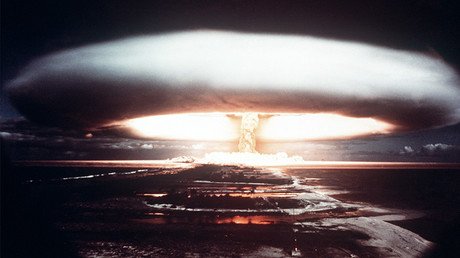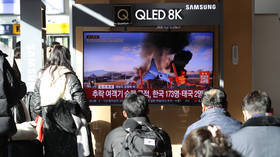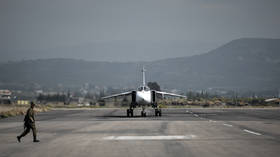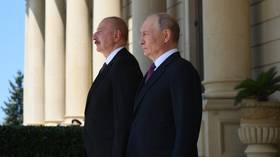‘Preventing nuclear war is bigger than any political shenanigans’
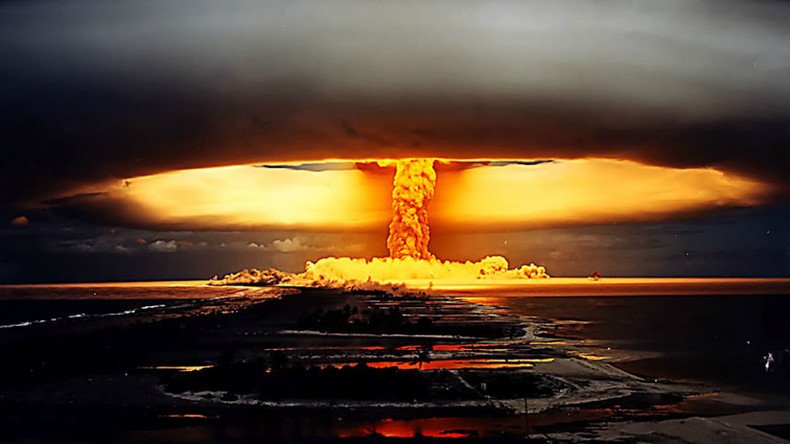
Countries should realize the reality of nuclear deterrence is going to break down sometime in the future because of the danger of inadvertent miscommunication between superpowers, says Winslow Myers from the War Prevention Initiative.
Seventy-two years ago, on August 6, the United States dropped the first nuclear bomb on the Japanese city of Hiroshima killing an estimated 140,000 civilians. Three days later a second bomb was dropped on Nagasaki killing 75,000 civilians.
The anniversary comes as tension between the US and North Korea are the highest they've been since the Korean War. On Saturday, the UN voted unanimously to impose sanctions banning approximately $1 billion in exports and barring countries from buying North Korean products like coal, iron, and seafood.
Thousands gathered at an annual peace ceremony in Hiroshima on Sunday where the prime minister of Japan called for global cooperation to achieve a world without nuclear weapons.
Last month 122 countries adopted an international treaty banning nuclear weapons at a United Nations meeting.
Despite widespread support, Japan along with nine nuclear-armed nations, including the US, Russia UK France Israel and China refused to take part.
However, both the US Congress is pushing defense legislation that would require the military to begin developing medium-range missiles in violation of a 1987 treaty between the US and Russia.
RT America’s Natasha Sweatte discussed this with Winslow Myers, author of ‘Living Beyond War: A Citizen's Guide’ and board member of the War Prevention Initiative.
RT: What is your take on the language on both the bills in the House and Senate?
Winslow Myers: What is left out of this story it is what you just said: it is an incredibly historic moment that these 122 nations signed this treaty. Now I know why our Congress is being tough on Russia right now, and it has to do with not wanting to roll over and do too much cooperation with Russia because of that all Trump situation. If Russia allegedly messed with the United States elections, I'm an American citizen, and that concerns me greatly. But when it comes to violating nuclear treaties or what's happening with this whole nuclear situation, I identify as a global citizen, and I think more people should. And I’m especially identifying with 122 countries that signed that treaty outlawing nuclear weapons and it is a very historic moment.
RT: Historic indeed. President Trump has already come out and said Congress has included “unconstitutional provisions” in the sanctions bill against Russia. Do you think this legislation will stir up even more friction between the president and Congress?
WM: Yes. Friction is Mr. Trump's middle name. But so what? The issue of preventing nuclear war is so much bigger than anything with Mr. Trump shenanigans.
RT: Let's talk about how the UN approved the Treaty of the Prohibition of Nuclear Weapons in July. Japan along with nine countries with nuclear capabilities declined. US ambassador Nikki Haley, however, defended the absence of the US from the negotiations saying “There is nothing I want more for my family than a world with no nuclear weapons. But we have to be realistic. Is there anyone that believes that North Korea would agree to a ban on nuclear weapons?” What are your thoughts?
WM: I read that interview with Nikki Haley, and I question what realism is exactly. These sanctions - which were unanimously passed against North Korea - are excellent but even better or in addition to that the US, China, and Russia and if possible the other nuclear powers need to convene a long-term conference whether it is independent of the United Nations or part of it, to begin to live up to their obligations under the nuclear non-proliferation treaty that is going to reduce North Korea's paranoia. Just convening such a conference would start to do that; it will be a gesture of goodwill. But nobody is talking about that. Who speaks for Earth? We had a very conservative president who was opposite to Gorbachev, Mr. Reagan, some time ago who said: “a nuclear war cannot be won and must never be fought.” And I'd like to hear that from Mr. Putin, and I'd like to hear it from Mr. Trump. I'd like to hear that from Kim Jong-un. I think we demonize him and what he's worried about is what happened in Libya because they didn't have nuclear weapons or what happened to Saddam Hussein because he didn't have nuclear weapons. I think we need to ratchet things down a little bit on our own side.
RT: There have been efforts in the past to curtail nuclear testing such as the Partial Nuclear Test Ban Treaty of 1963, but this effort obviously didn't eliminate it. So, in your eyes what are the dangers of countries possessing massive stockpiles?
WM: It is not so much the danger of the stockpiles, it is the danger of any inadvertent miscommunication between superpowers who have or any other nuclear powers, like India and Pakistan, that have their weapons on high alert. These weapons are connected with thousands and thousands of electronic devices and on the other end of the electronic devices are human beings which are capable of making mistakes very easily…I can tell you lots of stories about how we came far too close to having an accidental nuclear war start. That's how it is going to happen.
RT: So you think that it is going to happen and there's no way to go about some kind of disarmament in a civil manner?
WM: No, I think we have to instead of playing chicken with each other, we have to worry less about capitulating to each other and worry more about capitulating to the reality that deterrence is going to break down sometime in the future. Because the odds of that are practically inevitable if you have this very highly technological system of weapons with electronic communications, you cannot go on forever. People can argue that deterrence has kept the peace for 70 years, that's fine. But we're talking about the future, a future in which nothing ever goes wrong, and nobody ever makes a mistake…
The statements, views and opinions expressed in this column are solely those of the author and do not necessarily represent those of RT.
